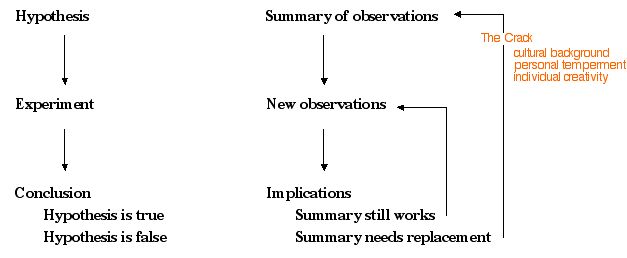Story of Evolution/Evolution of Stories
Paul Grobstein
January 2005
On Serendip
Thinking About Science
One way ... | A less wrong way ... |
 |
Science is a recursive, unending process of telling and revising stories to get them "less wrong". Being "wrong" and expecting to be "wrong" are essential elements of the process, to be valued rather than feared.
Science is not, cannot be about "Truth" ("real" or otherwise). It is about summarizing observations ("telling stories") and remaining skeptical about the future legitimacy of those summaries/stories. The quality of stories, in science, is measured by the degree to which they motivate new observations and new stories. The summaries/stories can be, and frequently are, useful for other purposes but should, for these purposes, always be understood as provisional and subject to change in the future.
The significance and effectiveness of scientific stories derives not only from their rootedness in observations and the skeptical posture with which stories about these are elaborated but also from their public and social character (the "crack" is an asset, a feature rather than a bug).
Science is not, cannot be "Objective" in the sense of eliminating all possibility that either observations or stories are "perspective free" (hence achieving a "view from nowhere"). Through the open sharing of both observations and stories, science can, does (and should) move continually in the direction of a "view from everywhere".
Scientific stories are valuable for the observations they summarize that one might not have made oneself, for the ways of thinking about things that might not have occurred to one on one's own, and for the new questions they raise that one might not have thought of alone.
[an error occurred while processing this directive]

